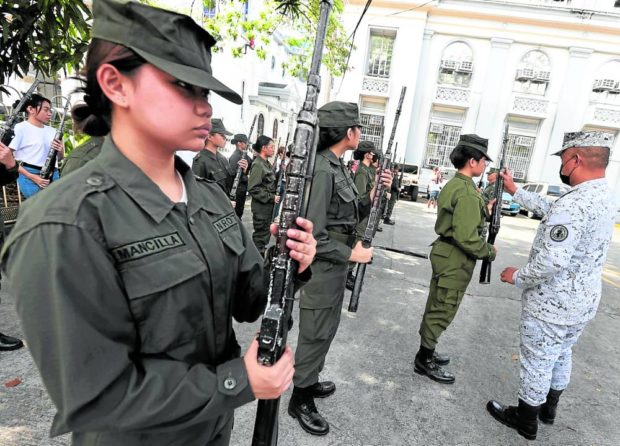Group calls out DND chief over mental health talk in ROTC pitch

BY CHOICE | Students undergoing military training by choice perform rifle-handling drills under an instructor in this photo taken on a Manila campus on Jan. 28, 2023. (File photo by MARIANNE BERMUDEZ / Philippine Daily Inquirer)
MANILA, Philippines — Health professionals belied statements by Defense Secretary Carlito Galvez Jr. that mandatory military training can “cure” mental health problems among young Filipinos, saying such claims have no scientific basis and mislead the public on proper treatment.
Licensed clinical psychologist Niño Mateo, who heads the Psychological Association of the Philippines, said a mental health literacy program should be implemented instead in schools.
In an email response, Mateo countered Galvez’s statement to senators that the compulsory Reserve Officers’ Training Corps (ROTC) program could cure students’ mental health problems.
“We do not have any proof that the ROTC will benefit the youth by promoting mental health, much less, curing mental health problems,” Mateo told the Inquirer on Tuesday. “We are wary of such generalized claims that may further confuse the public about the nature of mental health.”
He said evidence-based proof are the “ineffectiveness” and dangers posed by “militaristic-style therapies” to one’s well-being. “A proper mental health literacy program will be most appropriate to address mental health concerns,” he added.
Article continues after this advertisementHe said this entails “teaching the skills to engage in self-care, challenge the stigma surrounding mental health disorders, identify mental health issues, seek appropriate help and forge nurturing relationships among family and friends.”
Article continues after this advertisementGalvez backtracks
On Tuesday, Galvez walked back on his statement after drawing flak from health professionals, saying: “We fully understand and appreciate their concerns as mental health is an issue that affects the broadest spectrum of society.”
“What we intended to convey during the hearing was that through our enhanced ROTC program, we would be able to build the strength of character and resilience of our trainees, qualities which positively foster mental health,” he said.
Galvez said that the ROTC program that they envision at the Department of National Defense (DND) would include courses specifically designed “to foster resilience, self-leadership, character-building, and discipline.”
“We believe these are virtues that our trainees must cultivate not only for their personal growth and development as individuals, but more importantly, enable them to play a key role in building a just, humane, and democratic society,” he said.
He said the DND would “carefully take into account the spirit of RA 11036 (Mental Health Act of 2018) and the issues raised by our mental health experts in the crafting of our ROTC Training Program.”
Rethinking program
Health reform advocate Dr. Tony Leachon also disagreed with Galvez and urged lawmakers to “rethink” the ROTC bill because it may possibly “aggravate the mental health status of our students.”
“We have to remember, these adolescents are already psychologically and emotionally coping with other issues, especially with their identity crises aggravated by the pandemic, including the long K-12 programs,” he said in a Twitter post.
He said the “stifling military rigidity complicated by the possibility of government’s unpreparedness for the students in proper rules and regulations would be problematic to say the least.”
DOH: Different needs
Department of Health (DOH) officer in charge Maria Rosario Vergeire said “every person has different capacities in responding [to mental health problems] and becoming resilient on their own.”
“It’s not going to be the same for every person. Every individual has different needs to be mentally healthy,” she told reporters on Tuesday.
Vergeire said the DOH is working with the Department of Education (DepEd) to “further improve mental health services in schools.”
She said the Philippine Health Insurance Corp. is also drawing up its new mental health package that would be made accessible, even to students, by this year.
From 2021 to 2022, DepEd reported that 404 young students took their own lives; over 2,000 others attempted suicide.
The 2021 Young Adult and Sexual Fertility Survey noted that one in five youth aged 15 to 24 had thought of committing suicide.